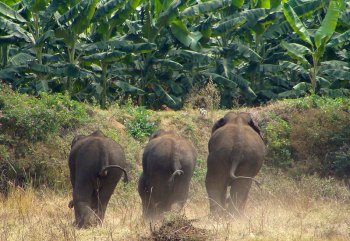Workshop on preventing Elephant Crop raiding
-Wrcsindia.org
Why do elephants come to eat crops in our farms?
Shared Boundaries: We know that many of our farms are located on the border of the forests. While feeding elephants come near the boundary of the forests and then enter our farms. And that
is where they see a lot of crops available so they feed onthem. No wild animals recognize man-made boundaries!!
Disturbance in the Forests: Many times we see people cutting lots of trees, bamboo and grasses from the forests. . Fires in the forest also destroy trees and grasses. Because of all this,
it is possible that there is a shortage of food plants for the
elephants. Perhaps that is why the elephants are forced to look for food outside the forests
Our farms are in their Home Ranges : Some areas where we have our farms were earlier forests and elephants used to live there. Now since the farms are there, a part of their home is gone.
Elephants have excellent memory so they still remember their old homes and visit these areas and instead of forests they enter our farms.
Crops are plenty and tasty: Elephants find our crops very tasty. They love to feed on paddy, corn, sugarcane, maize, sorghum, banana, jackfruit and all other types of vegetables. Also they
find it convenient to feed on them as they don’t have to go looking for different food items in the forests. Feeding on crops also saves their time and energy as a lot of food is available at one place.
Opportunist feeders: Elephants are very smart. They come to our crop fields at night when they know they will be safe as no one will be there. They can eat whatever they want and how much
they want. That is why fields which are unguarded are always easy targets for the hungry elephants!
What are these elephants doing bang in Kochi town, in front of a Corporate Office? Well, Kerala, which has the dubious distinction of having 700 captive elephants, decided that the festive spirit of Onam 2014, can be enhanced
by artificial elephants too! Photo Susan sharma
If we start practicing crop guarding regularly it is easy to keep the elephants out of the crop fields.
How to keep the elephants out of your farms
Elephants have strong sense of smell and they do not like the smell of chilly as it irritates their nose and eyes. Therefore, spicy chilly mixture acts as good barrier against elephants. But remember to use only spicy chilly
pods such local variety of
guntur chilly or spicy green chilly. These barriers are effective for preventing the entry of elephants and give us time to detect the elephants.
Take very spicy variety of chilly pods, powder it, make into a thick paste with grease and engine oil and apply the paste on a coir rope. Hang this rope around the boundary of your farm. This is called the “Chilly Rope”. The
smell of the chilly mixture is so strong that it masks the smell of ripe paddy also. When the paddy is in mature stage, the mixture should be applied every 3 days on the rope. And in rainy season, make sure that the mixture is applied daily.
Using the same method, we can use old clothes dipped in chilly mixture and hang it on the coir rope. This is called the “chilly curtain”.
AAACHOO!!

Elephants raiding a banana plantation near Bannerghatta, Karnataka
Photo courtesy Conservationindia.org